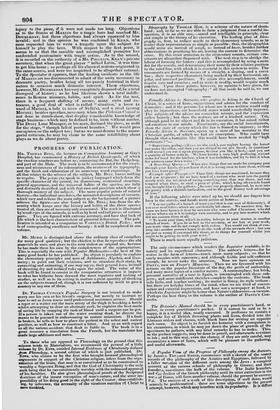Friend& Advice to Servants, who prnfess to belong to the
Church of Christ, is a series of hints, suggestions, and advice for the conduct of domestics : and if the persons for whose use it was written would only obey its injunctions, our household states would wonderfully improve. The subjects of the advice aire somewhat minute, and the expression rather homely ; but then the matters are of a kindred nature. Yet, although good in its object and fit in its execution, it has raised rather sad emotions in our minds. Enactments, say the social investigators, show the state of society which the law is framed to improve; so this Friendly Advice to Servants, opens up a state of lax morality in the Christian public, of which we had no conception. Who could have thought that a hortative like this would have been needed by "high ilrofessors ?"— " Sometimes, perhaps (if you are the cool:), you neglect having the loaves one under the other, and then you are obliged to cut new bread; or sometimes (still worse) you cut it upon purpose, because you like it best,—and you use a quantity of butter with it. We have known a very high professing servant make hot toast for the kitchen, when it was forbidden, and try to hide it when her mistress came down stairs !"
A Searching Query.—`• %Viten nice things that are made for company pass through your hands, di) you know that it is wrong even to taste them, without you have leave given ?" Example after P feeept.—" These little things are mentioned, because they lead you to greater ; for we have beard of a servant who went into the pantry merely with the intention of eating something nice that was there, aud was tempted when there, to steal a piece of plate, which being afterwards found out, brought him to the gallows. ;As sonic one properly observed, he went into the pantry with a thievish inclination, and so the great Enemy took advantage
of I ."
If the following adviee were acted up to, we should see fingers less busy in the streets, and hands more active at home-
" You are guilty of a breach of trust (and that is one sort of dishonesty), if you ever read letters which are accidentally left about. We mem this, be- cause we have known it done by servants who were called Christians, who did not see what a sin it is to indulge vain curiosity, and to pry into matters which did not concern them at all.
" To waste your time, which in reality belongs to your master, is another breach of trust. It' you lie in bed in the morning, or are lazy at your work, you waste time and do not comply with orders. You would not think of run-
g into another person's house to do the work of the servants there ; but you are just as wrong if you stand idly about, or do things for yourself whilst you ought to be getting on with your work."
There is much more equally judicious.


























 Previous page
Previous page